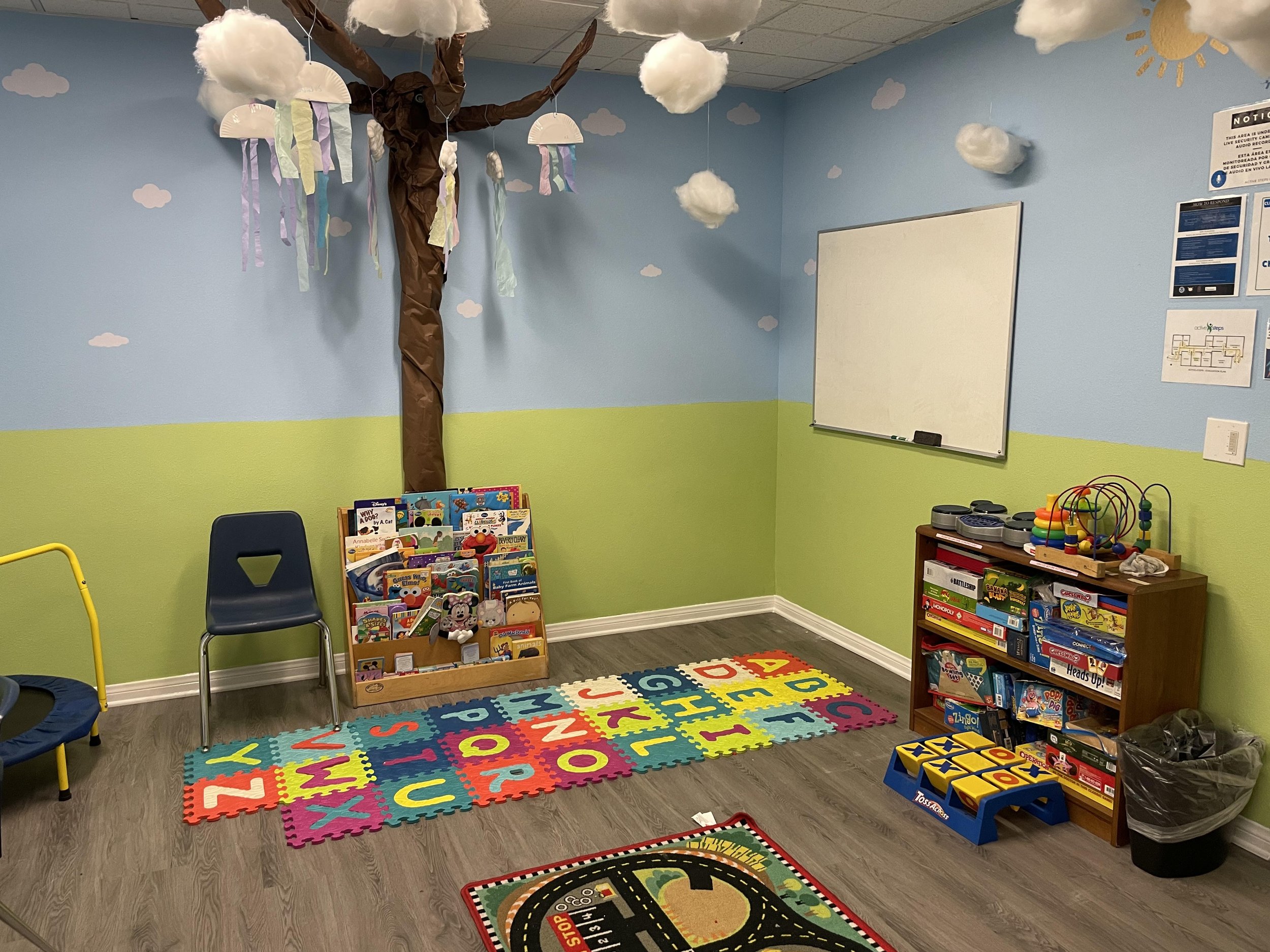
Welcome to ABA
Discover what ABA is and how it can support your child’s growth in everyday life. At Active Steps, we offer personalized, family-centered ABA services designed to fit your child’s needs and your family’s goals.
What exactly is ABA therapy?
Applied Behavior Analysis (ABA) is a therapy based on the science of how people learn and behave. It helps us understand how behavior works, how it’s affected by the environment, and how learning happens. ABA is widely recognized as an effective treatment for individuals with autism and other developmental conditions.
In simple terms, ABA focuses on building skills and reducing behaviors that might be interfering with learning or daily life. This can include helping a child communicate more clearly, follow directions, play with others, or manage big feelings in a more helpful way.
More about ABA
-
ABA uses a step-by-step approach to teach meaningful skills—starting small and building up over time. Every program is personalized to meet the unique needs of the child and their family.
Here’s how it typically works:
Assessment: We get to know your child—what they like, how they communicate, and what their strengths and needs are.
Goal Setting: Together with you, we identify areas where your child could grow (like communication, social skills, or daily routines).
Therapy Sessions: A trained Behavior Technician works one-on-one with your child to practice new skills, often through play-based activities.
Data & Support: We track progress carefully and make adjustments as needed. A Behavior Analyst oversees the plan and works closely with you every step of the way.
-
ABA has been around for decades and is backed by years of research. It was originally developed in the 1960s and has continued to evolve to become more child-friendly, natural, and supportive of family involvement.
Today, ABA is considered a gold standard approach for teaching children with autism because it is:
Individualized – No two children are the same, and neither are their programs.
Positive – ABA focuses on reinforcement, encouragement, and celebrating progress.
Goal-Oriented – Whether your child is learning to use words, follow directions, or build friendships, we work toward goals that matter to your family.
-
Parents often turn to ABA when they want:
Support in building communication, daily living, or social skills
Help understanding and responding to challenging behaviors
A structured but fun way to help their child reach their full potential
ABA is not a quick fix—but it’s a proven, flexible approach that helps children and families make meaningful and lasting progress.
-
Our services are tailored to your unique needs and goals. We work closely with you to understand your preferences, challenges, and aspirations, then craft a personalized plan to support your growth and well-being.
Objective Data Collection
Behavioral Assessments
Skill Acquisition
Reduction of Challenging Behaviors
Generalization and Maintenance
Collaborative Review Meetings
-
Before services begin, you’ll work with your service coordinator to set a consistent weekly schedule.
Families should plan to commit to at least 80% of the recommended weekly hours, as fewer hours can slow progress.
To help services start sooner, we recommend providing at least one 4-hour block of availability per day whenever possible.
What makes Active Step’s different?
At Active Steps, our services are built around a family-centered approach that values collaboration, communication, and care. We recognize that meaningful progress happens when the whole family is involved, so we prioritize keeping you informed and empowered every step of the way. Our team uses positive behavior supports, follows a hands-off policy focused on safety and de-escalation, and constantly evaluates and improves the quality of our care. Whether you’re new to ABA or continuing services, we guide you through the process with clarity and compassion, ensuring your child’s progress is a true team effort.
Getting Started with ABA Services
1. Assessment Authorization
Once you choose Active Steps or are assigned to us through your insurance, we will receive authorization for an initial assessment within 5-7 business days.
2. Evaluation
Our team will conduct a comprehensive assessment to understand your child's unique needs and develop a personalized treatment plan.
3. Individualized Plan
Together, we'll create a customized ABA therapy program tailored to your child's goals and learning style.
4. Ongoing Support
Our dedicated therapists will provide regular progress updates and collaborate with you to ensure continuous growth.
The Role of Your Team
Your Behavior Technician
The Behavior Technician implements intervention plans, provides one-on-one therapy, and collects client progress data. They collaborate with the treatment team, fostering a supportive environment for skill development.
Your Behavior Analyst
The Behavior Analyst leads the clinical team, conducting assessments, creating behavior intervention plans, and supervising interventions to address behaviors and teach new skills. They also provide ongoing support and training to ensure intervention fidelity and progress monitoring.
Your Clinical Supervisor
The Clinical Supervisor supports the Behavior Analyst, ensuring program fidelity and providing ABA support to parents and Behavior Technicians. They oversee program implementation and facilitate effective collaboration for continuity of care.
Your Service Coordinator
The service coordinator plays a crucial role in ensuring smooth operations by facilitating effective communication, scheduling, coordination and delivery of services to ensure the best possible outcomes for clients.
Even after your initial onboarding, our dedicated team will continue providing ongoing support and guidance throughout your journey with our services. We're committed to being a reliable partner, helping you navigate any challenges and celebrate your successes along the way.
Your clinician will regularly check in with you, ensuring your care plan remains aligned with your evolving needs and goals. We'll also offer resources, tools, and personalized recommendations to empower you and keep you motivated on the path to wellness.
Our Locations
With conveniently located ABA therapy centers across the state, we're dedicated to bringing our high-quality services closer to the families we serve. Our compassionate teams are ready to support you and your child's unique needs, no matter where you are.
Explore our network of state-of-the-art facilities, each designed to provide a warm, nurturing environment for your child's growth and development.
Frequently Asked Questions
-
For insurance funded services, they may require one of the following diagnoses or conditions to be approved for ABA services: Autism Spectrum Disorder (ASD), Attention-Deficit Hyperactivity Disorder (ADHD), Oppositional Defiant Disorder (ODD), Obsessive-Compulsive Disorder (OCD), Downs Syndrome, Intellectual Disabilities with related behavioral challenges, and Language Disorders with related behavioral challenges.
Private pay services may not require a diagnosis, but would still need to be assessed for need.
-
The onboarding process typically takes up to a week. To complete the process, you will need items such as your insurance card, your child’s diagnosis, and in some cases, an Exit Report or Summary of Benefits.
Our admin team is available to guide you through each step and provide a clear list of what’s needed to ensure a smooth onboarding experience.
-
Families are a necessary component of the assessment process. Throughout observations, the families will be asked to provide information about their child’s behaviors, preferences, and abilities.
-
Your care plan is tailored specifically to your unique needs through a thorough assessment process. We start by gathering detailed information about your goals, strengths, and areas for improvement. Our team of professionals then collaborates with you and your family to develop a personalized plan that focuses on achieving meaningful progress. We regularly review and adjust the plan to ensure it continues to meet your evolving needs.
-
The skills your child needs to learn will be identified during the FBA process. Based on the results of the interviews, assessments, and observations, the Behavior Analyst will identify goals for each child, which will then be approved by caregivers prior to implementation. Additional information about this process can be found in the FBA section on the Gettiing Started page.
-
ABA therapy is typically delivered multiple times per week, often ranging from 10–40 hours, depending on your child’s needs and clinical recommendations.
A consistent schedule (same days/times each week) is important for your child’s progress and for staffing your clinical team.
It’s important to consider after-school availability, weekends (if applicable), holidays, family vacations, and any other additional therapies or activities. Limited availability may delay the start of services or reduce the number of therapy hours your child can receive each week. To set realistic expectations, take time to assess your weekly routine, choose times when your child is alert and ready to learn, communicate openly with your ABA provider, and plan ahead for breaks or scheduling changes. Consistent and thoughtful scheduling supports the overall success of services. -
Many families have preferences regarding their ABA provider, such as gender, language, cultural background, or specific days and times for sessions. While we strive to accommodate these requests whenever possible, please understand that specific preferences can sometimes delay the assignment of a clinical team. Being flexible with your availability and staffing preferences helps us begin services more quickly and maintain consistent care for your child.
ABA therapy is a team effort—and YOU are the most important team member. When families and providers work together with clear communication and consistent expectations, children are better supported and more likely to thrive. If you have any questions about scheduling, availability, or what your family can realistically commit to, we’re here to help. Contact us to review your schedule and ensure you’re set up for a successful ABA experience.

